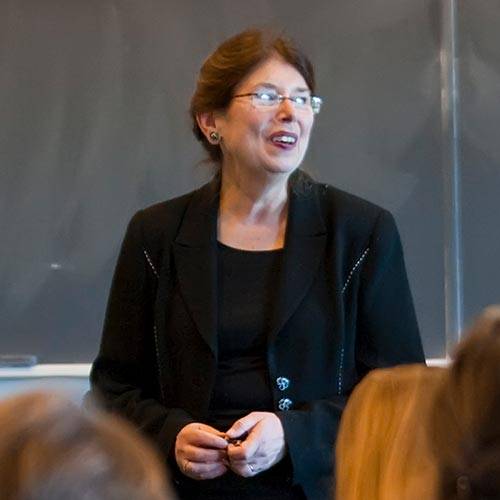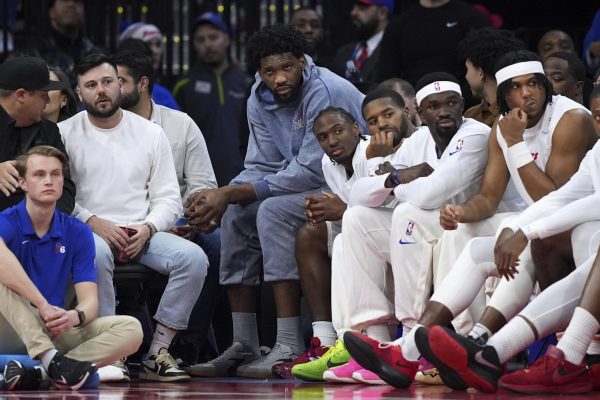Reception for Jane Pinchin: ‘This is Women Bringing New Things to This Place’
To celebrate 50 years of women at Colgate, there was a reception for the one and only Jane Pinchin on Friday, March 4. The event served two purposes: to bring members of the alumni community together during Alumni Weekend, and to put prominent Colgate faculty members center stage to talk about their experiences as women at Colgate.
As one of the back rooms in the Colgate Inn began to fill with Colgate community members and their reminiscing chatter, the voice of President Brian Casey settled everyone into their seats.
“As you might recall, we were encouraging people to stay six feet apart from each other for public health reasons. So we had an artist produce a graphic poster that featured celebrities that we knew were six feet tall. And we would say, please stay one Tom Hanks or one Mr. Rogers away from the next person. And we featured 13 sets of six foot tall celebrities. And then we added an illustration of Jane Pinchin.”
The room filled with laughter, including the chuckles of Jane Pinchin sitting front row with her family.
“I don’t think [Pinchin is] six feet tall. But it’s a tribute to her enduring and her endearing place at Colgate that she’s as recognizable to all of us as Nicolas Cage or Sigourney Weaver,” Casey said.
Jane Pinchin was one of the pioneering women to teach and lead here at Colgate. Pinchin first started working at the university in 1965 as a part-time English professor at the age of 22. She left to finish her doctorate and came back in 1969, whereupon she began creating her lasting legacy here at Colgate. She would take up the mantle of leading many departments, including the English department from 2005 until 2013. Her impact goes beyond just leadership positions — she paved the way for women at Colgate. This is precisely what brought alumni back to celebrate her at the reception.
“Today, we honor [Pinchin] for the part she’s played in making this university the distinctive place it is, as it begins its third century. We celebrate the ways in which she’s helped so many of you become the remarkable people you all are,” Casey said.
From there, the formal event began featuring various speakers: April Baptiste, professor of environmental studies and Africana and Latin American studies; Jennifer Brice, associate professor of English and director of Living Writers; Constance Harsh, department of English chair; and Kezia Page, director of Africana & Latin American studies.
The program for the evening began with a question for these speakers:
“When you arrived here at Colgate, and during your first years here, what surprises did you encounter?”
A major theme touched upon throughout the evening was how women were the ones usually trailblazing new studies and topics. Baptiste talked about her role within environmental studies when she first got to Colgate.
“[Environmental studies] was my whole program, where I was going to receive tenure. And that was pioneering, it was exciting. I got to charter my own course, no one else had done it before. But at the same time it did come with a few challenges … [I was] international, coming straight out of grad school and then also being a woman of color. So we had those intersectionalities to deal with on top of being the first person in an interdisciplinary program,” she said.
Next, Harsh used this opportunity to reminisce and talk about what women have meant to the Colgate community in the past.
“As I was thinking about this prompt, I thought, it’s really when we have occasions like this — when we talk about 50 years of co-education — is when we start talking about women again. Maybe that’s because we realize that there’s something limiting in assuming that everybody who’s a woman falls into the same category, we become more attuned to nuances, identity and experience as we celebrate multiplicity,” Harsh said. “But, there’s also a place for solidarity as well. … As I look back at 1988 and 1980, I thought, maybe there’s some spirit that could be recovered that would be valuable to recover.”
Brice spoke at length about the Living Writers program that she now runs, but she also talked about the magic of literature.
“Reading brings pleasure, insight, wisdom and empathy; it connects people across time and space, it makes us feel kinship with strangers, with people we may never meet partly because they don’t exist outside the pages of literature.”
Last to speak was Page, who potently addressed the question surrounding how she felt about joining and becoming a part of the Colgate community.
“There was a culture here, that I think women had a big part to play in, where we were still working very hard to prove that we should be here. And that I think had a big cost on us, and [I] was waiting for us to get to a place where we could be comfortable in who we are.”
In response to all of the speakers’ insights, Pinchin took the stand.
“This reception honors a moment in time, a movement that changed Colgate, and that is not mine, except as I’m a part of the work of a group of women faculty.”
Pinchin further expressed how she has seen Colgate change over her years here.
“If you go to the 1970 yearbook, which I did right before coming here, it’s astonishing. First of all, it’s got all the energy of anti-Vietnam, and it’s got all the energy of the world exploding. And a kind of lovely sloppiness in the production of this book by artists of that time. And it’s got the past of 1970, with page after page after page, and it’s all white men. In the Hollywood squares of those pages it’s quite an astonishing thing to see. Women came and women on the faculty came, and they really changed not only what people taught but also the way people were teaching.”
Pinchin concluded with remarks on the meaning of this entire event.
“This is women bringing new things to this place.”

Cooper Lowell is a sophomore from Charlottesville, VA concentrating in English. He has previously served as a staff writer for the Baker’s Dozen Section...










